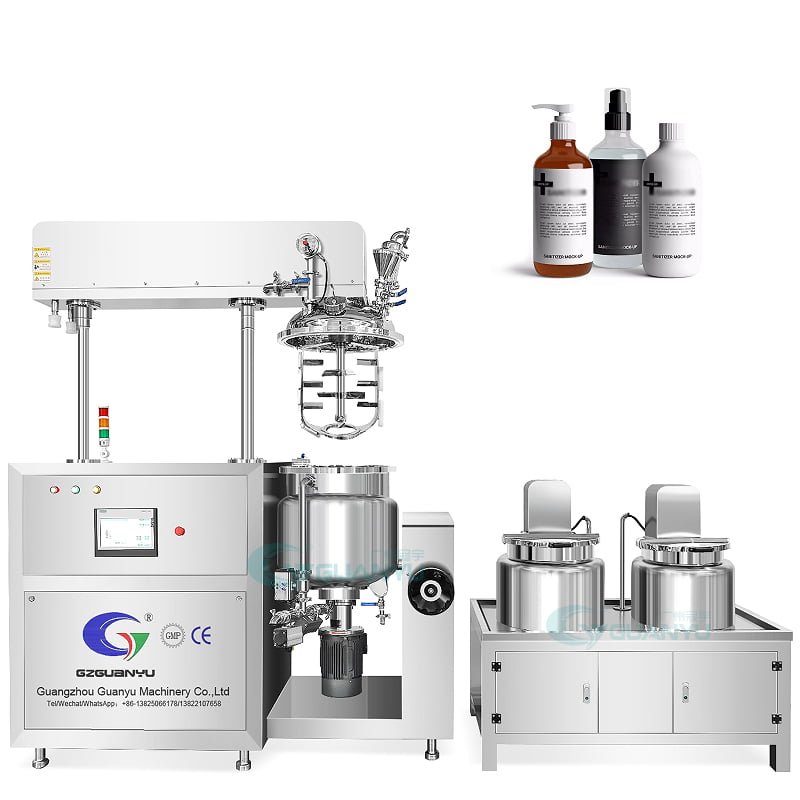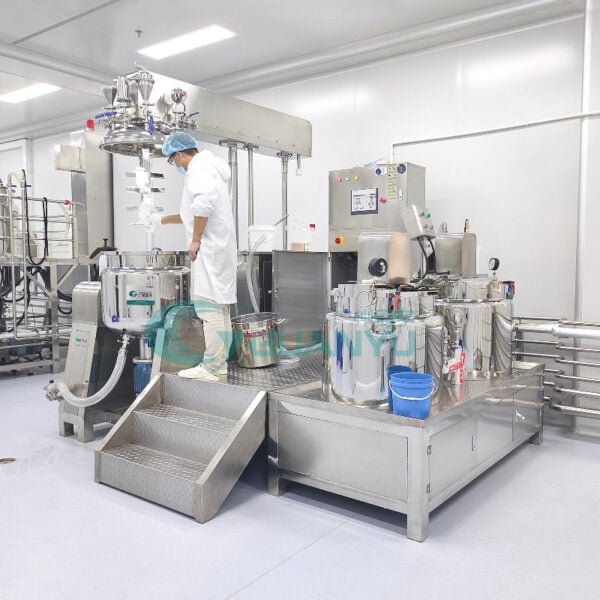液体皂需求持续增长, 卫生意识的提高和对有效清洁解决方案的需求推动. 这个生产过程的核心是 液体肥皂制作机器, 有多种配置, 包括带或不带均质器的选项, 加热能力, 以及单层或三层设计. 本文深入研究功能, 好处, 和这些机器的应用, 为潜在的买家和制造商提供全面的概述.
类型 液体肥皂制造机器
- 基本概述
液体肥皂制造机旨在自动化混合原材料的过程, 例如油, 苛性苏打, 和水, 进入同质液体肥皂产品. 机器的选择在很大程度上取决于生产能力, 所需的产品一致性, 和可用预算. - 均质器与. 非调子剂


- 与均匀的机器: 配备均匀机的机器可确保成分均匀混合, 这对于达到一致的产品质量至关重要. 这对于希望生产具有特定质地和外观高端液体肥皂的制造商尤其重要.
- 没有均匀的机器: 非调解机器更简单,可能更具成本效益. 它们适合较小的操作或生产基本的液体肥皂制剂.
- 加热选择
- 加热机: 内置加热功能的机器可以融化固体脂肪和皂化反应的加速, 导致生产时间更快. 此功能对于希望优化效率并满足更高需求的制造商至关重要.
- 非加热机: 这些机器依靠环境温度, 使其适用于冷过程制作肥皂制造商或不需要加热的液体肥皂.



- 单层与. 三层机器
- 单层: 这些机器通常便宜且易于操作. 它们非常适合较小的生产运行和企业刚刚从液体肥皂行业开始.
- 三层: 三层机器提供增强的绝缘和温度控制, 这对于需要精确热管理的过程有益. 该设计受到较大制造商的青睐,旨在大规模生产高质量.
液体肥皂制造机的关键特征

- 自动化和控制
大多数现代液体肥皂制造机都配备了高级控制系统,可以精确调整混合速度, 温度, 和成分比例. 这种自动化降低了人工成本并最大程度地减少人为错误. - 物质质量
机器的建筑材料(通常不锈钢)确保耐用性, 易于清洁, 和对腐蚀的抵抗力. 这在肥皂制造行业尤其重要, 卫生是最重要的. - 生产能力
取决于设计, 液体肥皂制造机器可以处理不同的批量大小. 较小的机器每批可能会产生数百升, 虽然较大的型号可以处理数千升, 迎合不同的业务量表. - 安全功能
在任何制造环境中,安全是一个关键的考虑. 液体肥皂制造机的设计具有安全机制, 包括紧急关闭控制, 压力缓解阀, 和操作员保护守卫.
使用液体肥皂制造机的优点
- 效率和速度
与手动方法相比. 这种效率使制造商可以扩展运营并迅速响应市场需求. - 质量的一致性
对成分比和混合过程的精确控制可确保每批液体肥皂符合相同的质量标准. 这种一致性对于建立品牌声誉和客户信任至关重要. - 成本效益
虽然对液体肥皂制造机器的初始投资可能很大, 劳动的长期节省, 物质浪费, 生产时间可以抵消这些费用. 企业可以通过简化的运营实现更高的利润率. - 定制化
许多液体肥皂制造机器都能产生各种配方, 允许制造商迎合不同的市场领域, 例如有机或特色肥皂. 这种灵活性可以帮助企业在竞争激烈的市场中与众不同.

申请 液体肥皂制造机器
- 化妆品行业
液体肥皂是化妆品行业的主食, 用于手工肥皂等产品, 沐浴露, 和洗发水. 该行业的制造商受益于确保产品一致性和吸引力的高质量机器. - 家用清洁产品
家庭清洁解决方案的需求激增, 制作液体肥皂在生产有效的清洁剂中起着至关重要的作用,以满足消费者需求. - 工业应用
一些制造商生产用于工业应用的散装液体肥皂, 包括消毒剂和脱脂剂. 专为大批量生产而设计的机器对于有效地满足这些需求至关重要.

结论
这 液体肥皂制作机器 对于希望生产高质量液体肥皂的制造商而言,这是重要的资产. 从同质化和加热功能到单层或三层设计的选项, 这些机器满足各种生产需求. 通过投资合适的机器, 企业可以提高效率, 确保产品质量, 并最终在竞争激烈的肥皂市场上蓬勃发展.
如果您正在考虑进入液体肥皂生产业务或希望升级现有设备, 了解液体肥皂制造机的功能和配置将指导您做出明智的决定.


Luckywinplus 听起来很有希望! 我一直在寻找一个幸运的网站. 任何人都了解他们的忠诚度计划? 幸运赢加
哟, Evotaya777 是您享受真正乐趣的地方. 我在这里玩了一段时间并且总是玩得很开心. 查看 埃沃塔亚777, 你可能会上瘾!